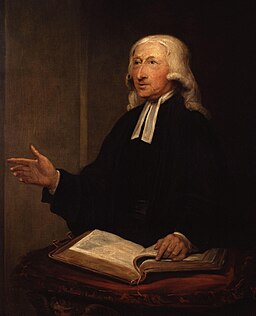
John Wesley preaching, by William Hamilton [Public domain], via Wikimedia Commons
On Sunday Christians of all branches of the church make their eager way to their favourite church, there to be joined by some of their best friends in a congregation come to participate in an act of worship. They would not miss it. Over the years, Sunday by Sunday, it has meant so much to them. Recharging their batteries, some would say. And so they came expectant that they would have a good sing – favourite hymns known and loved that warmed the heart; prayers couched in concern and love. And perhaps more likely they came hoping to be challenged, inspired, to hear a sermon that was both a revelation and relevant to their personal circumstances and need. They were seldom disappointed, their minister was a marvellous preacher. He knew what to say and how to say it. He could send them home with their batteries charged, faith refreshed, fears and doubts removed, and pointed them to the next step on their Christian journey. That is what they liked about their minister, he was nicely sure, always positive, left them in no doubt of where he stood and where the Lord was leading.
All well and good but I suspect it not to be the whole story. I suspect there were days when some set off for home in a different frame of mind. When they went home from church thinking – it was a marvellous, informative and challenging message. Recalling the sermon, reluctantly and timorously they found themselves saying, I do not think I could subscribe to that statement. If only I could be sure! If only.
I can feel uncomfortable in the company of the eternal optimist for whom life always seems to be going well. We have them in church, vociferous rather than tactful. Good folk, faithful and devoted to doing the will of God, but a testimony spoilt somewhat in the impression given that unlike some of us they have direct access to God: a hotline to heaven with all the answers to personal dilemmas, doubts and fears. One suspects that what is given as personal testimony is sometimes no more than an expression of personal indulgence. In their presence the if only disciple is vulnerable and feels his/her faith is decreed not big enough. There are occasions when we have no right even to contemplate to speak for God. I have heard some appalling (maybe well-intentioned) comments made at the side of a hospital bed, or a home where tragedy has struck. I have had to bite my tongue and leave any discussion about the Providence of God to another and more appropriate time. The more encouraging testimony is that which listens, questions and who can say no more than if only. If only I could be sure! There is no reason to consider ourselves to be inferior believers; no need to be ashamed. We are in good company. Dr Leslie Weatherhead, one of last century’s pulpit giants, who in his day brought many people to faith, towards the end of his ministry caused quite a stir in certain Christian circles when he wrote a book that described the inner turmoil with which he had to contend for most of his life. He called the book Christian Agnostic. I do not know about you, but I can identify with him. I too have doubts and questions, times when I am agnostic about aspects of faith and believing.
How can we be sure about God? Maybe the high priests and prophets of new-age atheism have got something valid and authentic. If only – how can we be sure about God? It depends on what kind of assurance we want – if is logical proof or mathematical certainty we require, we are headed for disappointment. Studying for my preacher’s exams before being an accepted candidate for ordained ministry, I was introduced to what were known as Proofs for the existence of God. What were those proofs?
- The world of nature pointed to God.
- The moral order in the world directed our gaze to God.
- People’s universal hunger for the supernatural provided evidence for the existence of God.
I cannot imagine being enlightened or converted by that kind of argument. Aids to our understanding God they may be, but they are by no means proof of his existence.
I have told the tale many times, and at least once on this blog, of John Wesley’s coming to an assurance, desperately wanted, yet sensing it could be denied him. Sailing home from Georgia an unsuccessful, distraught and unhappy clergyman, his ministry there a miserable failure and what faith remained in shreds, he was determined no longer to preach. How could he preach faith when he did not have it himself? On board ship as they headed home, Wesley became aware of a group of Moravian Christians. He was impressed by the way they lived the Christian life and practised the faith, and by their love and devotion to Christ. So much so, he resolved to seek help and counsel about his dilemma and spiritual crisis. It was the wise and saintly leader of the party who took John in hand. His counsel and encouragement to a broken man who yearned for faith and lost it: preach faith until you have faith. He did and I write this piece on the day 24th May (1738) we commemorate Wesley’s renewal and restoring experience and testimony: I felt my heart was strangely warmed and that I did trust Christ alone for salvation.
How can I be sure of God in the bad times when it feels as though God has deserted us; days when we are heading away from his blessing and empowering grace? If only? It may not be a bad thing to conclude with Wesley – if only! Practise the life of faith until you have it. The proof we look for is in the living.






